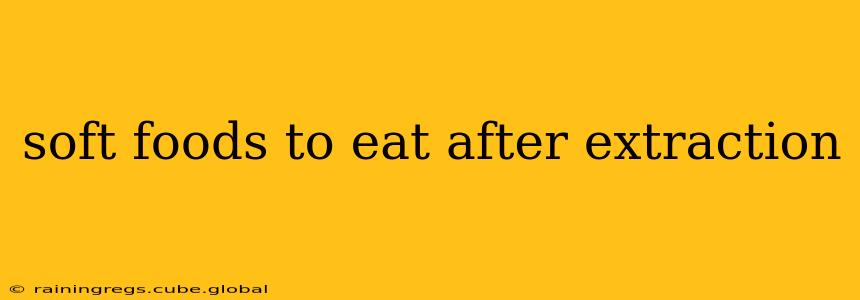Having a tooth extracted can be a somewhat uncomfortable experience, and the recovery process requires careful attention to your diet. Eating the right foods can significantly impact your healing and reduce discomfort. This guide explores the best soft foods to eat after a tooth extraction, addressing common questions and concerns.
What are the Best Soft Foods to Eat After Tooth Extraction?
Immediately following a tooth extraction, it's crucial to avoid anything that could dislodge the blood clot forming in the extraction site. This clot is essential for proper healing. Therefore, for the first 24 hours, focus on sipping fluids like water, clear broths, or smoothies (strain them thoroughly to remove any seeds or pulp).
After the initial 24-hour period, you can gradually introduce soft foods that are easy to chew and won't irritate the extraction site. Excellent options include:
-
Yogurt: A great source of protein and probiotics, beneficial for overall health during recovery. Choose plain yogurt and avoid those with added sugars or chunks.
-
Applesauce: Smooth and easily digestible, applesauce provides essential nutrients. Opt for unsweetened varieties.
-
Mashed Potatoes: A classic comfort food, mashed potatoes are soft and gentle on the gums. Avoid adding hard chunks of vegetables or crispy bacon bits.
-
Oatmeal: A nutritious and easily digestible option, especially if made with milk or broth instead of water. Avoid adding crunchy toppings.
-
Scrambled Eggs: A protein-rich choice, scrambled eggs should be cooked until very soft.
-
Smoothies: Blend fruits, vegetables, and yogurt for a nutritious and customizable option. Ensure there are no hard pieces or seeds.
-
Soups (broth-based): Choose soups with tender vegetables and avoid those with hard noodles or rice. Pureed soups are ideal.
-
Pudding: A simple and readily available option, but choose plain versions over those with added sugars or chunks.
-
Soft Cooked Vegetables: Pureed or very well-cooked vegetables like carrots or sweet potatoes can be a healthy addition to your diet.
Remember to avoid foods that are:
-
Hot: Hot foods can increase bleeding and discomfort.
-
Acidic: Acidic foods can irritate the extraction site.
-
Spicy: Spicy foods can also irritate the area.
-
Hard or crunchy: These can dislodge the blood clot and cause dry socket (alveolar osteitis), a painful complication.
What Should I Avoid After a Tooth Extraction?
Avoiding certain foods is just as important as consuming suitable ones. This includes:
-
Anything requiring vigorous chewing: Steer clear of steak, nuts, chips, and popcorn.
-
Straws: Sucking through a straw can dislodge the blood clot.
-
Alcohol and smoking: These can hinder the healing process.
-
Acidic drinks and foods: Orange juice, soda, and tomatoes should be avoided.
-
Spicy foods: These can irritate the already sensitive area.
How Long Should I Eat Soft Foods After Tooth Extraction?
The length of time you need to stick to a soft food diet depends on the complexity of the extraction and your individual healing process. Generally, you should transition back to your normal diet within a week, but it's crucial to listen to your body. If you experience any pain or discomfort, continue with the soft food diet for a few more days.
What if I Develop Dry Socket?
Dry socket, also known as alveolar osteitis, is a painful complication that can occur after a tooth extraction. If you experience severe pain, a bad taste in your mouth, or a visible empty socket, contact your dentist immediately.
Can I Eat Anything Solid After a Tooth Extraction?
Gradually reintroduce solid foods once the initial healing period (approximately 7 days) is over. Start with softer foods and slowly introduce harder ones as you feel comfortable. Pay attention to your body's signals, and if you feel any pain, switch back to softer foods.
When Can I Eat Normal Food Again After a Tooth Extraction?
Most individuals can return to their regular diet within a week, but this may vary depending on the individual and the complexity of the extraction. Always consult your dentist or oral surgeon for specific advice related to your situation.
Remember, proper nutrition is vital for a successful recovery. Following these guidelines will help ensure a smoother and less painful healing process after your tooth extraction. Consult your dentist or oral surgeon if you have any concerns or specific dietary questions.
